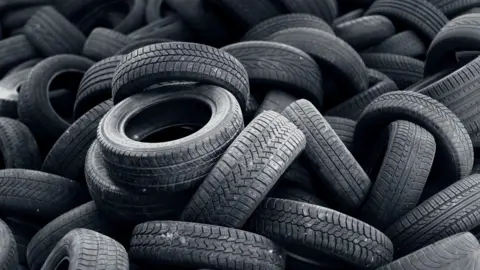In a proactive measure to combat illicit practices surrounding the exportation of used tyres, the Environment Agency (EA) has announced the introduction of enhanced checks on tyre exports from the UK. This decision comes on the heels of a revealing investigation by the BBC, which uncovered that millions of tyres were being sent to makeshift furnaces in India rather than being recycled appropriately. The EA acknowledged in its latest report that it is “highly likely” that a portion of these exported tyres have been diverted to illegal industrial operations known for harmful and environmentally damaging practices.
Every year, the UK generates approximately 50 million waste tyres, which amounts to nearly 700,000 tonnes. Official data indicates that about half of those tyres are exported, predominantly to India, under the notion that they are destined for recycling. However, in a report earlier this year, the BBC’s File on 4 Investigates, alongside the non-profit journalism organization Source Material, highlighted a troubling finding: an estimated 70% of exported tyres—both from the UK and globally—end up in unlicensed pyrolysis plants. These facilities, often described as home-made pressure cookers, process the tyres to extract materials such as carbon black, steel, and oil. Unfortunately, the extraction processes implemented in these sites pose significant health risks and contribute to severe environmental degradation.
The situation was tragically underscored by an explosion in January that killed two women and two children at a pyrolysis plant in Maharashtra, India, where tyres sourced from Europe were being processed. Following this incident, BBC reporters documented dire environmental consequences surrounding these facilities, illustrating soot-covered landscapes, dying vegetation, and polluted waterways—an indicator of the serious public health issues impacting local communities. Villagers reported experiencing chronic coughs and eye ailments attributed to the toxic emissions generated by these plants.
In light of these findings, the EA conducted a review, concluding that it could not verify that the exported tyres were being handled responsibly upon arrival at their intended destinations. The agency communicated its obligation to halt waste exports if there is substantial risk of irresponsible environmental management. Therefore, effective from 1 October, the new measures will mandate that exporters substantiate that the waste is being processed in an environmentally compliant manner.
Despite the EA’s announcement, critiques have emerged from various stakeholders. Campaigners from the pressure group Fighting Dirty expressed concern that the proposed regulations lacked adequate detail to truly remedy the loopholes that criminals exploit, likening the new checks to mere “self-certification paperwork” coupled with inspection threats, which they argue are not a significant departure from existing procedures. Georgia Elliott-Smith, the group’s founder, underscored a pervasive skepticism regarding the potential impact of the changes.
Simultaneously, the Tyre Recycling Association (TRA) expressed disappointment that the EA did not consider banning the export of whole tyres, a strategy that has gained traction in Australia. The TRA advocates for a policy wherein tyres are shredded before export, which could deter illicit sales and better regulate the tyre recycling industry.
In conclusion, while the EA’s commitment to enhanced scrutiny over tyre exports is a step towards ensuring that waste management practices align with environmental standards, the effectiveness of these measures remains to be seen. Both campaigners and industry figures will be closely monitoring the situation to determine whether these changes result in a tangible shift in the management of used tyres or merely fill the gap with more administrative complexity. The true test will be whether the new regulations effectively protect public health and the environment against the hazardous practices currently rampant in certain sectors of the recycling industry.











